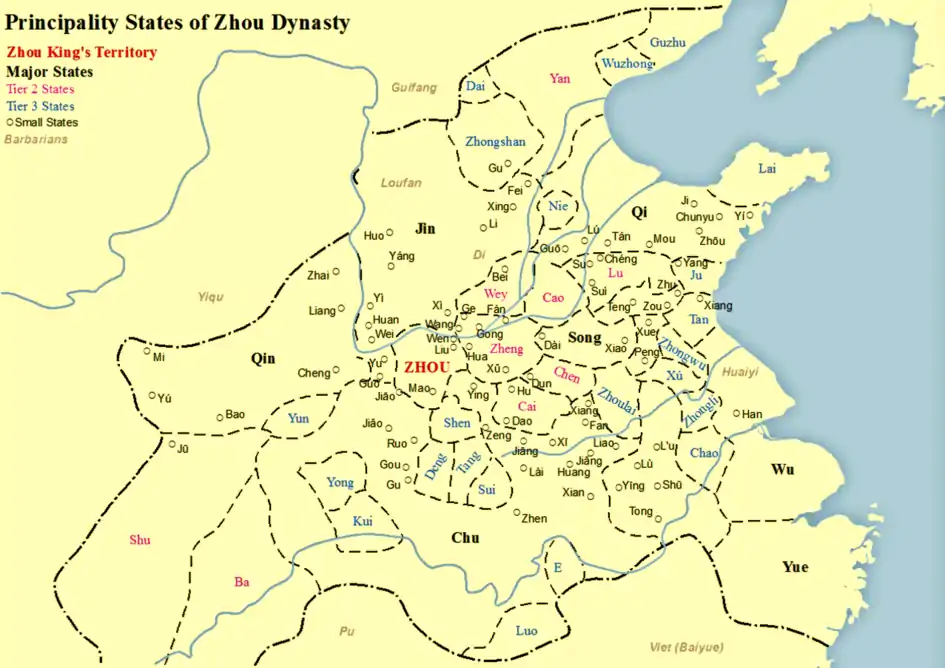State of Lai 萊國 | |||||||
|---|---|---|---|---|---|---|---|
| ?–567 BC | |||||||
 Lai is on the tip of the Shandong Peninsula bordering Qi | |||||||
| Capital | Changle (昌樂) Linqu (臨朐) Ni (郳) | ||||||
| Common languages | Old Chinese | ||||||
| Government | Monarchy | ||||||
| Duke of Lai | |||||||
• ?–567 BCE | Duke Gong of Lai | ||||||
| History | |||||||
• Established | ? | ||||||
• Conquered by Qi | 567 BC | ||||||
| |||||||
Lai (simplified Chinese: 莱; traditional Chinese: 萊; pinyin: Lái), also known as Láiyí (萊夷), was an ancient Dongyi state located in what is now eastern Shandong Province, recorded in the Book of Xia. Tang Shanchun (唐善纯) believes lái means "mountain" in the ancient Yue language (古越语),[1] while the Yue Jue Shu (越絕書) says lai means "wilderness".[2][3]
History
Lai was a traditional enemy of the State of Qi to its west. As soon as Jiang Ziya, the first ruler of Qi, was enfeoffed at Qi, the state of Lai attacked its capital at Yingqiu. In 567 BC, Lai attacked Qi but was decisively defeated by Duke Ling of Qi, and its last ruler Furou, Duke Gong of Lai, was killed.[4][5] Lai was a large state, and Qi more than doubled in size after annexing Lai.[4][6][7] The people (Dongyi) were moved to Laiwu, where Mencius later called them the Qídōng yěrén (齊東野人), the "savages of eastern Qi".
Rulers of Lai
- Furou (浮柔), Duke Gong of Lai (萊共公) ?–567 BC
See also
- Mount Penglai (蓬萊山)
- Penglai Pavilion (蓬萊閣)
- Penglai, Shandong (蓬萊市 / 蓬萊區)
References
- ↑ 威海市地名综述 Archived 2010-10-11 at the Wayback Machine
- ↑ "百越地名及其文化蕴意". Archived from the original on 2011-07-07. Retrieved 2010-11-07.
- ↑ Milburn, Olivia (translator) (2010). The Glory of Yue: An Annotated Translation of the Yuejue shu. Series: Sinica Leidensia, Volume: 93. Leiden & Boston: Brill. p. 138-139. Quote : "March on lai [萊]; lai means uncultivated land." Chinese original "宿之於萊。萊,野也。"
- 1 2 Han Zhaoqi (韩兆琦), ed. (2010). "House of Duke Tai of Qi". Shiji (史记) (in Chinese). Beijing: Zhonghua Book Company. pp. 2564–2568. ISBN 978-7-101-07272-3.
- ↑ Zuo Qiuming (translated by James Legge). "Book IX. Duke Xiang". Zuo Zhuan (in Chinese and English). University of Virginia. Retrieved 23 May 2012. Chapter VI.
- ↑ "东莱古国与西周王朝之关系——从黄、渭两河流域出土的有铭青铜器谈起". Archived from the original on 2012-03-14. Retrieved 2010-11-07.
- ↑ 莱夷及莱国史研究综述 Archived 2011-07-07 at the Wayback Machine